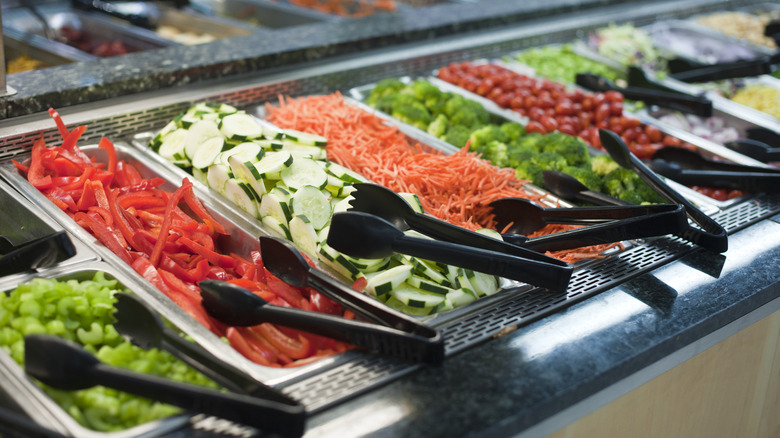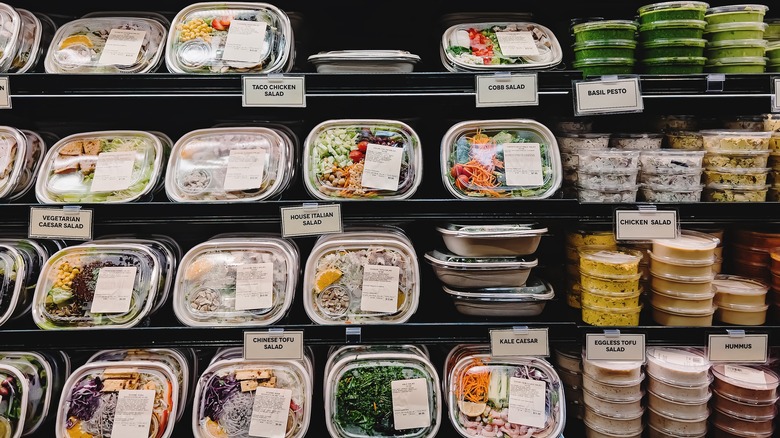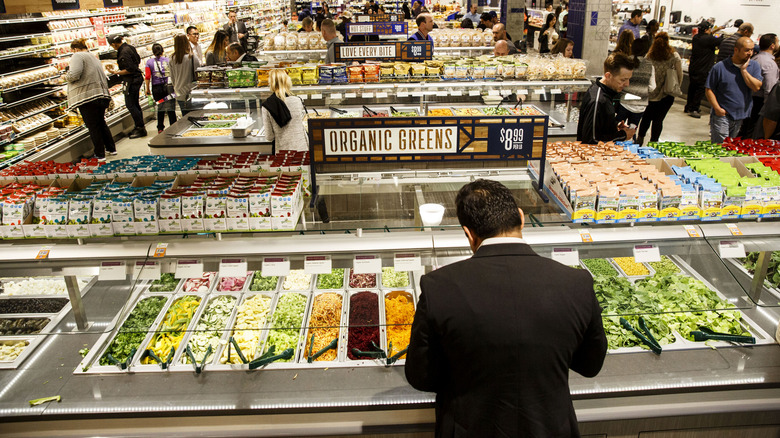It May Be Time To Bid Farewell To The Salad Bar
Life at the grocery store is largely returning to normal in the wake of the COVID-19 pandemic. In-person shopping has increased compared to the height of the pandemic, according to Winsight Grocery Business, and the White House says grocery inflation is slowing down. Not everything is business as usual at the supermarket, though. Self-service salad bars that were shut down due to concerns about spreading the virus may not be coming back to stores.
By mid-2021, it was clear salad bars had stopped pulling in the interest they once had pre-pandemic, according to CNN Business — despite the fact they were once a major draw. With more people working from home, as well as shopping for groceries online, retailers couldn't always sell the products in the salad bar fast enough to make them feasible. Concerns also mounted about what's safe to eat, due to heightened awareness of how germs spread, which kept people away from scooping up raw veggies at the store. So, the "new normal" meant that grocery stores either drastically scaled back the size of in-store salad bars, moving more toward pre-packaged items, or got rid of the salad bar altogether.
Over the next couple of years, these trends have continued, meaning it may be time to say goodbye to the salad bar forever.
In-person shopping hasn't returned to pre-pandemic levels
The biggest reason why the salad bar's days might be numbered is: not enough people patronizing them. Before the pandemic, grocery-store salad bars were an easy and inexpensive place to get a quick lunch for office workers. However, CNBC reports that, in 2023, American workers are still not returning to offices and that, "U.S. office occupancy remains stagnant around 40% to 60% of pre-pandemic levels."
Many of those people working from home are also becoming omnichannel shoppers, according to Forbes; this means that, in addition to occasionally shopping in-person, they're doing more ordering online and using curbside pickup, which cuts down on impulse shopping and drastically reduces in-store exposure to the salad bar. Without the pre-pandemic volume of shoppers scooping up fresh salads, more product goes bad before it's eaten, which is a waste of food and labor costs for the grocery store. And pre-made grab-and-go salads are the natural replacement for the salad bar.
People still harbor health concerns
Folks might also not hit the salad bar because they're still, unsurprisingly, squeamish about hygiene after going through the health scrutiny of the pandemic. When the pandemic hit, displays of cold, raw items became suspect to a lot of shoppers. While we now know a lot more about how the coronavirus is spread, and roughly 70% of the population is vaccinated — per the C.D.C. – many feel selecting and eating raw food that's touched by a lot of strangers is a no-go — maybe forever. Heading into 2023, SmartBrief found that "62% of shoppers [were] still concerned ... about getting COVID-19 while shopping."
It's simply not looking good for salad-bar lovers at the moment. If more workers start returning to the office, salad bars might make a comeback. But for now, if you want a salad-bar experience, it'll probably have to be at a restaurant instead of a grocery store. There, at least, TribLive reports, buffets and salad bars have already bounced back from the negative effects of the pandemic.


